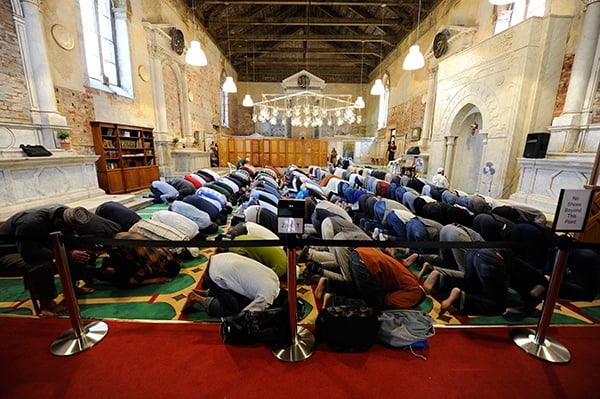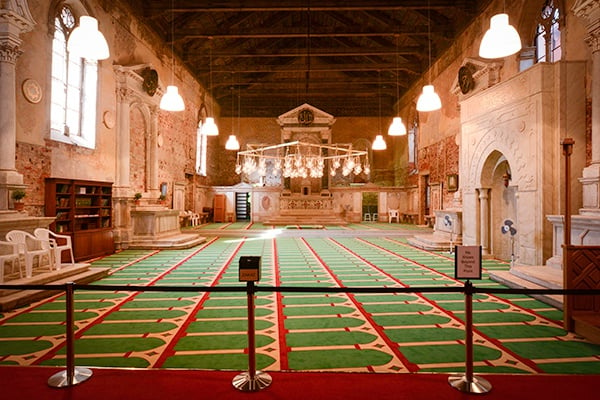Art & Exhibitions
Venice Authorities Shut Down Art Mosque by Christoph Büchel for Icelandic Pavilion
The mosque was declared a safety threat before it even opened.

The mosque was declared a safety threat before it even opened.

Lorena Muñoz-Alonso

Authorities in Venice have shut down the working mosque installed by Swiss artist Christoph Büchel in the city center as part of his presentation for the Icelandic Pavilion in the 2015 Venice Biennale. The closure was confirmed by phone to artnet News by a Venice Biennale press officer.
According to the Art Newspaper, the decision to close the mosque was taken following an evaluation by a public safety committee. The overcrowding of the old building, where Friday prayer gatherings exceeded the legal limit of 90 people, was also cited as a problem.
In a statement sent to artnet News today, the Venice Biennale hoped the closure of the pavilion could be revoked:
The Venice Biennale, although it cannot comment on the decision taken by the competent authorities in various capacities concerned with the security and management of the city, nor on the merits of autonomous artistic expression, in itself independent as part of each national participation, hopes that solutions can be found that permit the reopening of the pavilion with the participation of Iceland in the 2015 Biennale.
Yesterday, ANSA reported that the City Council of Venice had informed both the Icelandic Art Center and the Biennale that it would be withdrawing the authorization for the mosque installed in the former Catholic church of Santa Maria dell’Abbazia della Misericordia, a 10th century building that had been closed for over forty years.

Christoph Büchel, The Mosque, installation view, at the Icelandic Pavilion, Venice Biennale (2015). Courtesy of the artist; Icelandic Art Center/photographers Bjarni Grimsson and C. Büchel.
Büchel’s THE MOSQUE: The First Mosque in the Historic City of Venice was, indeed, the first mosque ever to grace the historic center of the city. But it’s has been a short-lived endeavor of barely two weeks of duration.
The issues with the pavilion-mosque began even before it opened to the public on May 9. A few weeks before the opening of the project for the Biennale preview week, authorities in Venice notified the Icelandic Art Center that local police thought the project was a “threat to public safety” (see Venice Police Label Christoph Büchel Art Mosque in Icelandic Pavilion a Public Safety Threat).
The mosque was located near a pedestrian bridge, a location which police claimed made it difficult to provide the safety surveillance required due to the terrorist threat from extremists.
According to Hyperallergic, the project had also upset Catholic authorities and Venetian city officials, who say they were never consulted or asked for permission for anything other than an art exhibition.
Yesterday, on the eve of the pavilion’s closure Björg Stefánsdóttir, director of Icelandic Art Center, published a letter on the institution’s website stating:
Negotiations with Italian authorities began in the middle of April, when we received a statement claiming that the work was impossible to implement, as it was a threat to the public.
[…]
It was no easy feat to implement this work, and one of the major issues was securing an exhibition space, which was not confirmed until the end of March, just a month before the intended opening. Two weeks later the authorities started procedures to try and stop the installation, and in fact the Icelandic Art Center did not receive the go-ahead until a couple of hours before the opening of the exhibition, and then with the proviso that almost none of the planned activities would take place!
[…]
Now we must face the possibility that Italian authorities may shut down the Icelandic pavilion and Büchel’s contribution this week. That will, however, not change the fact that the work itself will not be stopped. It is not even necessary to physically experience this work of art (even though it is impressive to see it in person as the physical and visual experience is remarkable per se).
The Mosque is the type of artwork that can be experienced simply by hearing or even reading about it.
The director of the Icelandic Art Center was not immediately available for comment when contacted by artnet News.
Meanwhile, the website of Büchel’s mosque project is still online.